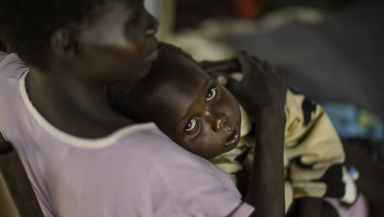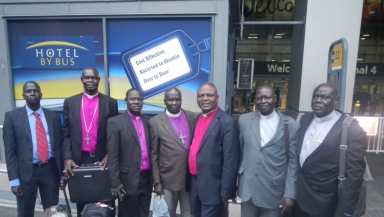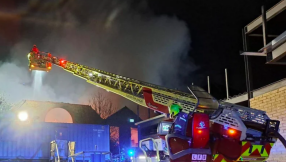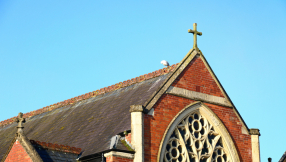
Church leaders in South Sudan said yesterday that the world has turned its back on the war-torn nation and little is being done to help the millions in desperate need of humanitarian aid.
Representatives from the Africa Inland Church, Episcopal Church of Sudan, Presbyterian Church of East Africa and the Pentecostal Church in South Sudan met in London yesterday to launch an appeal in partnership with the Barnabus Fund, urging the West to support their efforts in rebuilding peace.
They spoke of a joint vision to see the Church reach its potential to bring reconciliation across the fractured country, but insisted that the international community must recognise the severity of the situation and come to its aid.
"We believe the Church can make a difference," Bishop Martin Mogga Ilfoga of the Africa Inland Church declared.
"We cannot stand by and not act."
Significant political unrest has plagued South Sudan since its secession from the north in 2011 following two bloody civil wars.
A fresh wave of violence began on 15 December last year in Juba, the capital city, after an attempted coup by soldiers loyal to President Salva Kiir's former deputy Riek Machar.
The fighting subsequently escalated, spreading throughout the country and fracturing it along ethnic lines, though leaders in South Sudan have stressed that the war is political, not tribal.
"Our situation is not a tribal one, in reality it is political," a bishop from the Episcopal Church of South Sudan said today.
"It is about politics and power, that is all."
Described as "the most pressing humanitarian crisis in Africa," the UN reports that that an estimated 1.5 million people have been displaced and 4 million are facing immediate food insecurity. Droughts and an inability to cultivate crops as a result of ongoing violence have caused a famine to sweep across the nation.
Moreover, the South Sudanese government is unable to access money as fighting rages on in the oil-rich region in the north.
However, as tensions in the Middle East continue to spiral and the world's attention is diverted to the horrific situations in places like Iraq, Syria, Gaza and Ukraine, church leaders in South Sudan say their plight has been pushed to the sidelines.

"The international community has forgotten us," one bishop mourned.
"Please see how our people are suffering," he urged. "People are dying without reason. Over one million people are dead now."
The delegates underlined that the Church is in the best position to deliver aid and bring about peace in South Sudan, given its presence throughout the country. Bishop Martin explained that UN agents have restricted access to certain areas, while the Church is uniquely mobile.
"Thank God there are people on the front line who can go wherever they need to, and who are prepared to die for the sake of their people," he said, underlining the importance of advocacy in the life and role of the Church.
"The world should pay attention to South Sudan – it is very serious, very, very painful," he added. "But our people have confidence in the Church; those in the grassroots are the ones who empower church leaders to take initiative, because they hope in the Church."
Peace talks are currently ongoing in the Ethiopian capital of Addis Ababa between the warring parties, and though the bishops said there is a feeling of hopelessness in South Sudan, with international backing it is possible that a peace deal will be brokered soon.
"We are hoping that very soon there will be a peace, but we are not sure yet," a delegate from the Pentecostal Church in South Sudan said.
The bishops have written a letter as part of their appeal, in which they condemn the "egregious human rights abuses on all sides" of the conflict.
"We lead Christian communities in the world's newest nation where a significant majority of our people are Christian. Yet we suffer from many enemies – hunger, poverty, violence and even genocide. We are deeply saddened and grieved by the egregious human rights abuses on all sides. Even pastors have been killed and churches burnt," the letter reads.
"Tribalism has reasserted itself and those who fought together shoulder to shoulder for our independence have now turned on each other. Since then hundreds of thousands of people have been displaced; there are already signs of famine which promises to become worse and we face the possible breakdown of the whole country."
The letter also warns that the future of South Sudan is being "undermined" through the breakdown of education throughout the country – "This is a time bomb for vulnerability to radicalization by extremist groups" – and finishes with a commitment to working ecumenically to see South Sudan reconciled.
"God calls the Church to bring peace and stability to South Sudan. However we acknowledge that we have not always been faithful to this calling," the bishops write.
"We as church leaders now want to respond unitedly. We are committed to act together as one body."
A website and Twitter feed will be launched soon, until then, more information about the appeal can be found through Friends of Sudan or Barnabus Fund.













